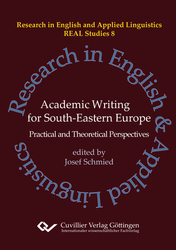| Departments | |
|---|---|
| Book Series (97) |
1381
|
| Nachhaltigkeit |
3
|
| Gesundheitswesen |
1
|
| Humanities |
2370
|
| Medienwissenschaften | 16 |
| Theology | 57 |
| Philosophy | 102 |
| Law | 423 |
| Economics | 852 |
| Social sciences | 417 |
| Sports science | 48 |
| Psychology | 233 |
| Educational science | 190 |
| History | 183 |
| Art | 111 |
| Cultural studies | 166 |
| Literary studies | 117 |
| Linguistics | 88 |
| Natural Sciences |
5407
|
| Engineering |
1798
|
| Common |
98
|
|
Leitlinien Unfallchirurgie
5. Auflage bestellen |
|
Advanced Search
Academic Writing for South Eastern Europe (Volume 8) (English shop)
Practical and Theoretical Perspectives
Josef Schmied (Editor)Preview
Preface, PDF (120 KB)
Table of Contents, PDF (120 KB)
Extract, PDF (240 KB)
This contribution introduces the key concepts of academic writing, metalanguage and genre. Metalanguage is seen to include all writer-reader interaction, esp. stance and engagement markers. The concept of genres in academic writing is discussed as a core-periphery model with the research article in the centre and the conference presentation, research monograph, handbook article and the chain from BA through MA to PhD thesis as other core genres. All concepts are explained and illustrated by examples from the ChemCorpus, which can serve as a (partial) reference corpus to all the other national mini-corpora in the SE European academic writing project and beyond. A research-based approach means that writers do not learn rules, but discover patterns and conventions themselves, either by testing ideas from textbooks or by exploring their own small corpora, even to test whether their linguistic variables are appropriate for their text/genre or socio-biographical variables. They can also use comparisons with similar corpora to position themselves in the spectrum between individual identity and disciplinary convention. Through this approach graduates gain skills that should be useful for their own writings at university and even for their professional life afterwards.
| ISBN-13 (Hard Copy) | 9783954049592 |
| ISBN-13 (eBook) | 9783736949591 |
| Final Book Format | A5 |
| Language | English |
| Page Number | 204 |
| Edition | 1. Aufl. |
| Book Series | REAL Studies / Research in English and Applied Linguistics |
| Volume | 8 |
| Publication Place | Göttingen |
| Publication Date | 2015-04-02 |
| General Categorization | Non-Fiction |
| Departments |
Linguistics
English and American studies |
| Keywords | Metalanguage, South Eastern Europe, Genre |








